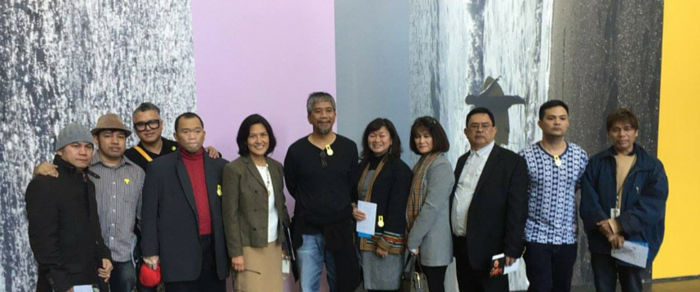 Professor Reuben Ramas Cañete of the UP Asian Center shared his experiences as an art critic in an art forum, “Critical Platforms” held at the Vargas Museum, University of the Philippines Diliman last 17 October 2015.
Professor Reuben Ramas Cañete of the UP Asian Center shared his experiences as an art critic in an art forum, “Critical Platforms” held at the Vargas Museum, University of the Philippines Diliman last 17 October 2015.
In his talk, Professor Cañete highlighted the need for art critics to be accessible, especially through popular media, and noted that the challenge they face pertains to selecting what (kind) of art they will and should evaluate. He also discussed notions of what to him is “quality writing”—one which is independent of academic jargon.
Professor Cañete was part of the panel, “The State of Art Criticism in the Philippines: Challenges and Opportunities;” where he was joined by UP Vargas Museum Curator Patrick D. Flores and noted art critic and Art+ Magazine Contributor Editor Cid Reyes.
“Critical Platforms” is a project conducted by the Art+ Magazine in partnership with the UP Vargas Museum. It seeks to “provide a platform for “discourse on the state of art criticism in the country.” Learn more about Critical Platforms.
On 30 October, as a trustee of the Erehwon Art Fundation in Quezon City, Professor Cañete was invited to the inauguration of the mural, “Deconstructing ‘Filipino,’” which is part of the exhibit “Art and Anthropology: Portrait of the Object as Filipino.” The mural was later unveiled at the Field Museum of Natural History in Chicago, Illinois on 7 November 2015.
Also present at the inauguration were Joey Cuisia, Philippine Ambassador to the United States, and Generoso D.G. Calonge, Consul General for the Philippine Consulate in Chicago.
In an article published by the Philippine Star, notable Filipino Writer Butch Dalisay wrote that the 28’ x 7’ mural portrays “both a celebration and indictment of our rich and complicated history, invoking all manner of element from the archetypal bulol and the revolutionary KKK (a symbol that predictably sparked some controversy, given its American context) to McDonald’s and Tito, Vic & Joey.”
Funded by the John D. and Mary T. MacArthur Foundation, the “Art and Anthropology: Portrait of the Object as Filipino” is a “cross-continental initiative” by Filipino-American artists (Jennifer Buckler, Elisa Racelis Boughner, Cesar Conde, Joel Javier, and Trisha Oralie Martin) and Filipino artists (Leonardo Aguinaldo, Florentino Impas Jr., Emmanuel Garibay, Jason Moss and Othoniel Neri). The exhibit depicts Philippine artefacts in the Museum’s collections, much of which were collected between 1907 and 1910 by several anthropologists, including Fay-Cooper Cole.
Professor Cañete was invited not just as a faculty of the Asian Center but also as a trustee of the Erehwon Art Foundation in Quezon City. While in Chicago, he also took part in Ambassador Cuisia’s official consultative meeting with the Filipino-American Midwestern Community at the Philippine consulate on 30 October, during which the five Filipino artists were introduced.
Photo: Members of the Filipino and Filipino-American artists, as well as officials from the Erehwon Art Foundation (including Professor Cañete, 4th from left), the Field Museum of Natural History, and the Chicago Museum of Contemporary Art. Taken in the Museum of Contemporary Art, whose curator is a Filipina-American.Courtesy of Dr. Almira Astudillo-Giles.
Professor Reuben Ramas Cañete has a Ph.D. in Philippine Studies from the University of the Philippines Diliman and specializes on political aesthetics, masculinity studies, and the preservation and promotion of local artistic traditions in Cebu and Bulacan. At present, he is Assistant to the Dean for Research and Publications, and is a member of the Executive Council of the National Committee on Visual Arts, National Commission for Culture and the Arts. Visit his faculty profile.
The Asian Center offers M.A. degrees in Asian Studies with four fields of specialization: Northeast Asia, Southeast Asia, South Asia, and West Asia. The Center also has an M.A. program in Philippine Studies that allows students to major in Philippine society and culture, Philippine foreign relations, or Philippine development studies. The Center offers a Ph.D. program in Philippine Studies in conjunction with the College of Arts and Letters and the College of Social Sciences and Philosophy. For an overview of these graduate programs, click here. The Asian Center also publishes Asian Studies: Journal of Critical Perspectives on Asia, the latest issue of which can be downloaded at the journal's website. View recent and upcoming Lectures & Conferences and read other News & Announcements. Join our mailing list to receive invitations to lectures, conferences, etc.

